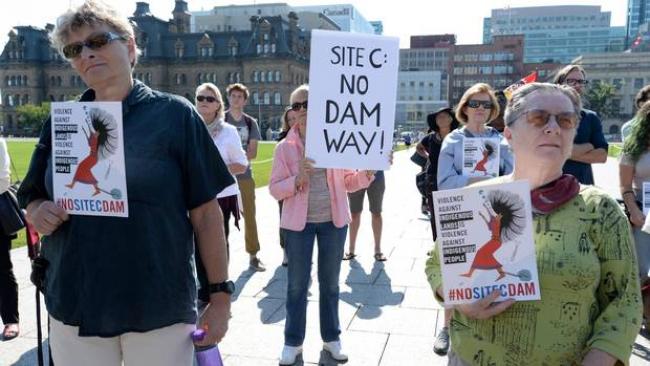Articles Menu

First Nations leaders from British Columbia were in Ottawa this week to tell federal politicians they have been betrayed by a government that promised a new relationship with indigenous people then approved the construction of a massive hydro dam that threatens their traditional way of life.
The $8.8-billion BC Hydro project on the Peace River, known as Site C, received authorizations from the federal departments of Fisheries and Transport earlier this summer.
It won provincial and federal approvals in 2014 after undergoing a joint environmental review, but the West Moberly and Prophet River First Nations have appealed to the Federal Court of Appeal saying the project will interfere with their hunting, fishing and trapping rights and will flood some of the best agricultural land in northeastern B.C.
Roland Willson, chief of the West Moberly First Nation, told a news conference in Ottawa on Tuesday that two existing dams have already taken up 80 per cent of the Peace Valley. “Site C represents the destruction of the last 50 per cent of the 20 per cent that’s left,” Mr. Willson said.
When Prime Minister Justin Trudeau was making his pitch in last year’s election, he said there was no more important relationship to him than the one between Canada and its indigenous people. His government has since adopted the United Nations Declaration on the Rights of Indigenous Peoples, which gives indigenous people the right to “free, prior and informed” consent over development on their traditional lands.
“By approving permits for Site C, he’s violated all those promises he made,” Mr. Willson said.
In addition, he said, Justice Minister Jody Wilson-Raybould twice paddled the Peace River when she was the regional chief for the Assembly of First Nations. “She stood there beside me and stated that what the B.C. government and the federal government are doing is running roughshod over the First Nations,” Mr. Willson said. “And now she is here in a position to actually make a difference and she’s turned her back on us.”
Ms. Wilson-Raybould issued a statement pointing out that the Site C project was approved by the previous government. “I acknowledge that this is a contentious issue. It would be inappropriate for me to comment further at this time as this issue is before the courts and falls within the mandate of Environment Canada,” she said. “I am confident that all voices will be heard.”
Transport Minister Marc Garneau, whose department approved navigation changes that were required for the dam to proceed, said Tuesday that the authorization “was for the greater good. We believe it was the right thing to do.”
Fisheries Minister Dominic LeBlanc said in a statement that the regulatory process leading to the authorization of the dam construction included comprehensive consultations with indigenous groups and other stakeholders.
“The authorization also includes more than 40 conditions that must be adhered to by BC Hydro and our department will be monitoring compliance every step of the way,” Mr. LeBlanc said. “It is also worth noting that the authorization also requires BC Hydro to collaborate with indigenous groups to improve information sharing and identify opportunities to further address impacts to the current use of fisheries resources for traditional purposes, and they must provide indigenous groups with capacity funding to support these activities.”
But Mr. Willson said the project, which is in the preparatory stages, should be halted until after the legal challenge has ended.
He arrived in Ottawa at the same time as a “Peace caravan” carrying dam protesters. It had travelled from British Columbia and is heading to Montreal where the court hearing began earlier this week.
Yvonne Tupper, a Saulteau First Nation woman who was part of the caravan, said on the front steps of Parliament that she and the other protesters are calling on Mr. Trudeau to keep his pre-election promises to the First Nations. “Actions speak louder that words,” Ms. Tupper said. “Stop the Site C dam which is [threatening] a little bit of territory that we have left that we want to keep saved.
[Top photo: People converge on Parliament Hill in Ottawa to protest the Site C hydroelectric dam project on Sept. 13, 2016.
(Sean Kilpatrick/THE CANADIAN PRESS)]